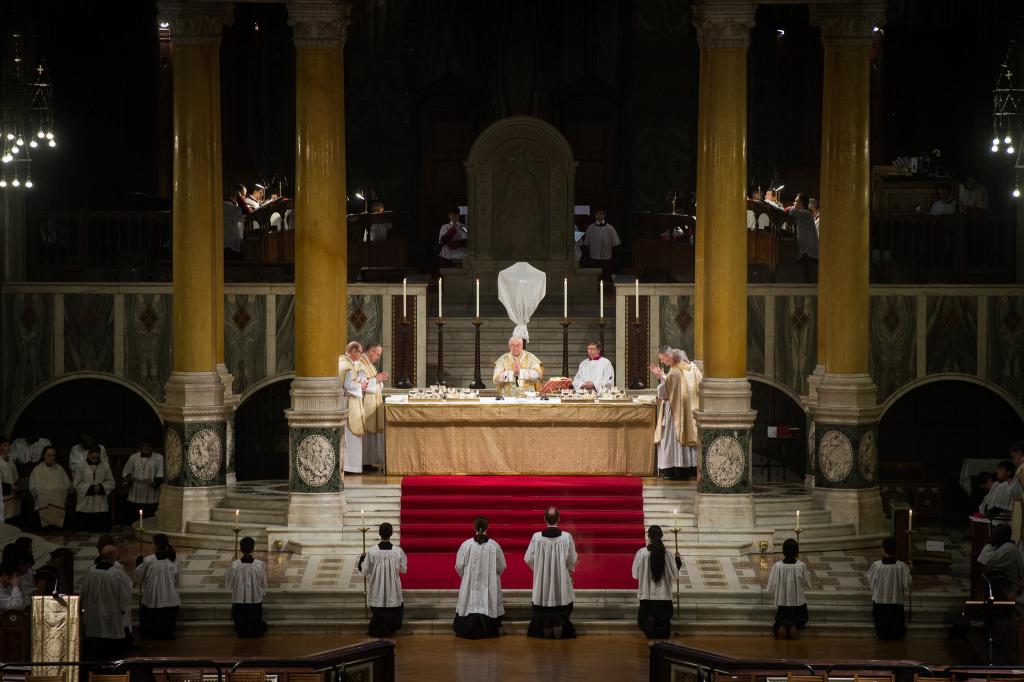Homily given by Cardinal Vincent Nichols at the Mass of the Lord’s Supper at Westminster Cathedral on Maundy Thursday, 18th April 2019
With this Mass of the Lord’s Supper we enter into the Sacred Triduum. These three days mark the suffering, death and resurrection of Jesus, the Christ, the anointed one of the Father. This evening we are invited by the Lord to begin our sharing in those life-changing events by which the power of death is broken and the burden of sin is lifted from our souls. He invites us to see, in this Sacred Meal, the symbolic anticipation of his death: This is my Body given for you; this is my Blood poured out for you. This evening we receive what we witness tomorrow.
The world into which Jesus came, the threshold he crosses in a particular way with his arrest in the Garden, taking place shortly after the Last Supper, is a world of violence and killing. This is the world he came to redeem, to bring it back to its original purpose and beauty, its Garden of Eden. As the Book of Genesis depicts, through sin we are excluded from that original Garden and in its place create a world marked by mistrust, suspicion, rivalry, anger, violence and killing. Nowhere is that expressed more poignantly than when, in the Book of Genesis, the descendent of Adam, named Lamech, proclaims that ‘sevenfold vengeance is taken for Cain, but seventy-sevenfold for Lamech’ (Gen 4:24).
In entering this world of ours, Jesus comes to offer and make possible another way: Not seven times are you to forgive, but seventy times seven, says Jesus (Mt 18:22), thus reversing the ancient curse, bringing that reversal about in his death on the Cross. This is the multiplication of pardon, just as he multiplied the loaves of bread that all may be fed.
In these days of his redeeming work, then, Jesus gives us a new way of living. His way is clear: forgiveness, compassion, truthfulness in all things, an absence of pride, service of those in need. This is made possible because he lives always in the presence of his Father, in union with the Father, seeking the Father’s will and close to him in constant prayer. This is his new way of being human. This evening he presents to us this new way of life in one eloquent gesture: the washing of the disciples’ feet. Jesus not only opens for us this new way of life, but he commends it to us, saying ‘I have given you an example that you also should do as I have done’ (Jn 13:15).
This evening, as we continue with this Holy Mass, celebrating the Last Supper of the Lord, let us remember, as we receive the Lord in Holy Communion and in his blessing, we are asking that the example of Christ may be realised in our lives too. We come forward to receive not because we are worthy but because we long for the newness of Christ to find its home in our lives. We recognise in him a healing remedy for our failings. We know him to be the only source of new life who, if we are faithful to him, will slowly transform us, day by day, into images of his goodness and inner beauty.
Just before we share in this Eucharistic Meal, I will hold up the Body and Blood of Christ and proclaim to you: ‘Behold the Lamb of God! Behold him who takes away the sins of the world!’ This is the Lamb of Sacrifice, first glimpsed by Abraham as he took the knife to his son Isaac; foreshadowed in the lamb eaten by the chosen people on the night of their escape from slavery, their food for their journey, whose blood saved them from the avenging angel. This is fulfilment of the words of Isaiah speaking of the Lamb who is innocent yet led to slaughter. This is the Lamb of God, who becomes triumphant over death, transformed from victim into the victorious Lamb of the Book of Revelation of whom we sing: ‘Worthy is the Lamb who was slain to receive power, riches, wisdom, strength, honour, glory and blessing’ (Rev 5:12).
This is the Lamb of God who gives his life not only for us but also to us that we might live in him, through him and with him, always to the glory of God the Father. His symbol is the Cross. And who can forget the image we saw on Tuesday morning of the Cross of Christ, shining through the smoke and ruins of the interior of the great Cathedral of Notre Dame, summoning us to renewed hope, declaring that no matter the ruination we may make of our lives, he is there, calling us again to his side that his grace may again be at work in us.
We adore you O Christ and we bless you, because by your Holy Cross you have redeemed the world! Amen.
